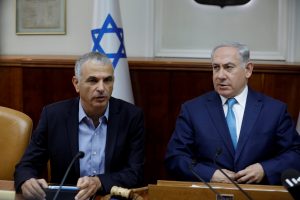
JERUSALEM (Reuters) – Israel has expedited construction permits to enable temporary quarters for the U.S. Embassy to open in Jerusalem as planned in May, the Finance Ministry said on Tuesday.
U.S. President Donald Trump in December broke with other world powers by recognising Jerusalem as Israel’s capital and announcing the U.S. Embassy would be moved there from Tel Aviv.
Trump’s reversal of decades of U.S. and broad international policy was welcomed by Israeli Prime Minister Benjamin Netanyahu as a “historic decision”. But it drew criticism from around the world and outraged Palestinians, who want a capital for their own future state in eastern parts of the city.

FILE PHOTO: Israeli Prime Minister Benjamin Netanyahu (R) and Israeli Finance Minister Moshe Kahlon attend the weekly cabinet meeting at the Prime Minister’s office in Jerusalem December 24, 2017. REUTERS/Amir Cohen/File Photo
Israel has said the Embassy will be opened on May 14, the 70th anniversary of its founding. A U.S. official said it would be located at a provisional site in Jerusalem that now houses a U.S. consular section.
Building a permanent embassy could take several years.
Finance Minister Moshe Kahlon said in a statement that he would empower the Jerusalem municipality to waive the permits that would have been required for a wall and an escape route at the interim site.
“We will not allow needless bureaucracy to hold up the transfer of the American embassy to Jerusalem, Israel’s eternal capital,” Kahlon said.
“This is a strategic diplomatic move for the State of Israel and the planning agencies under me will do whatever is necessary to accommodate the schedule being demanded.”
Jerusalem Mayor Nir Barkat had voiced concern about the timeline, telling Israel Radio on March 9: “I hope their (Americans’) schedule will be kept.”
The Israeli planning permit waiver for the Embassy will be good for three years, the Finance Ministry statement said.
“Initially, the interim Embassy in (the Jerusalem neighbourhood of) Arnona will contain office space for the Ambassador and a small staff,” said a U.S. Embassy official in Tel Aviv.
“By the end of next year, we intend to open a new Embassy Jerusalem annex on the Arnona compound that will provide the Ambassador and his team with expanded interim office space,” he said, adding that a search for site for the construction of a permanent embassy had begun.
Most countries do not recognise either side’s sovereignty in Jerusalem and have embassies to Israel in the Tel Aviv area.
Netanyahu has described Jerusalem as “the capital of the Jewish people for 3,000 years”, and Trump said the embassy move was “a long overdue step to advance the peace process”.
Palestinian leaders said Washington’s decision meant it was no longer an honest broker in efforts to revive peace talks, which collapsed in 2014.
(Writing by Dan Williams; Editing by Jeffrey Heller and Raissa Kasolowsky)








